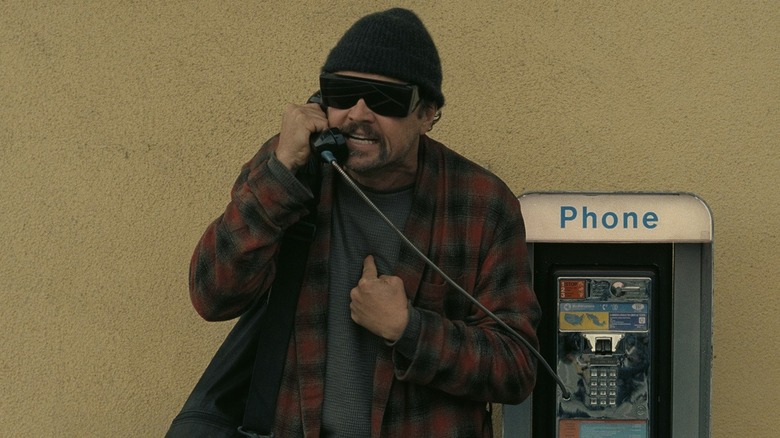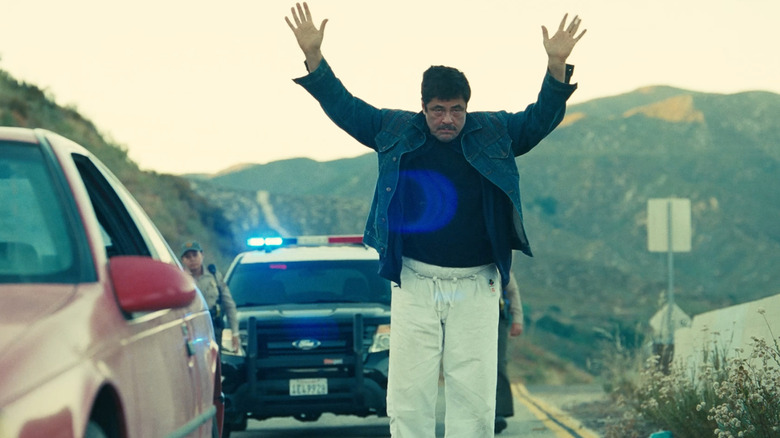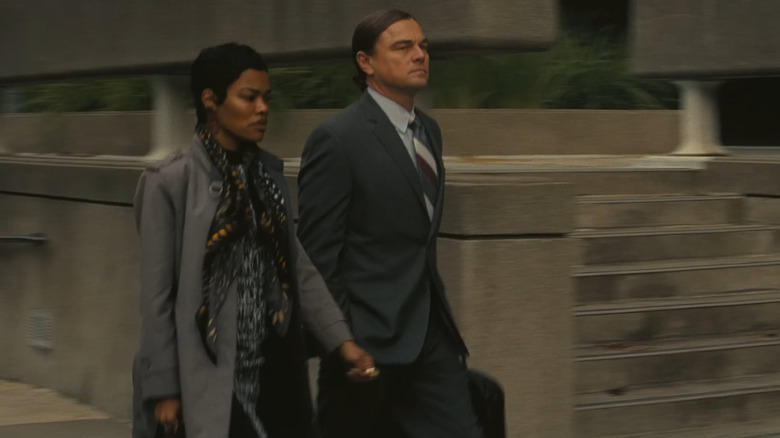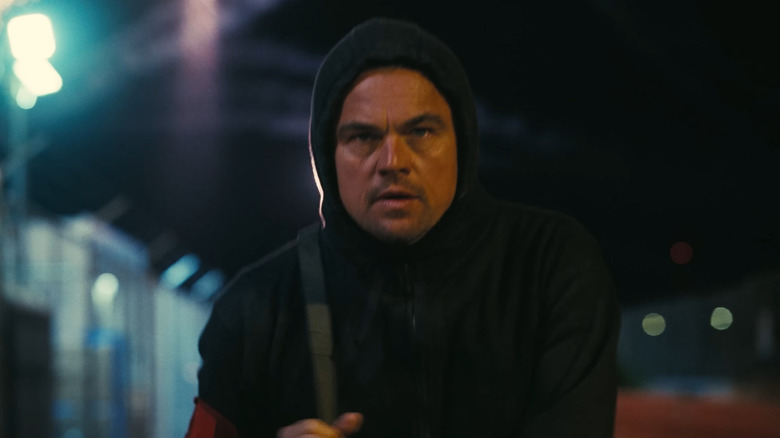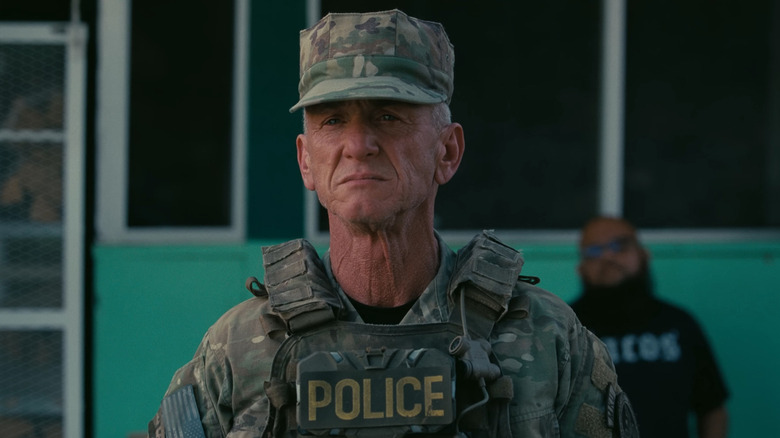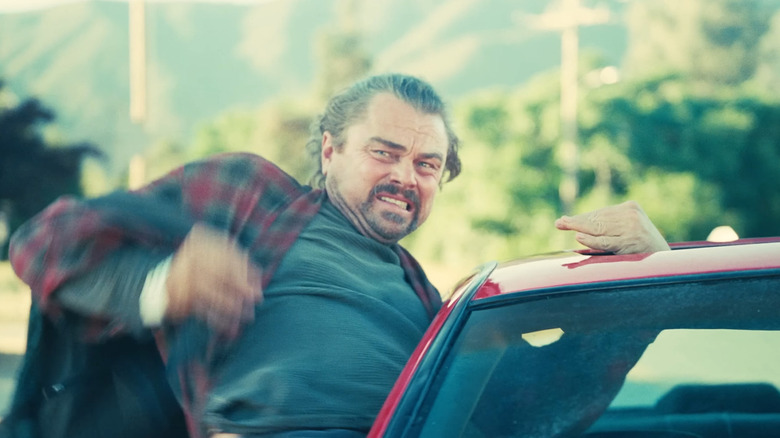5 Reasons Why One Battle After Another Flopped At The Box Office
It may be one of the best-reviewed movies in recent memory, but, unfortunately, that didn't help Warner Bros.' buzzy "One Battle After Another" break out at the box office. The wildly acclaimed dark political action dramedy from director Paul Thoms Anderson ("There Will Be Blood") flopped on opening weekend, even though it did come in at number one domestically with $22 million. However, that number is far too low to give this movie any hope of becoming a hit, even with unreasonably long legs.
"One Battle After Another" added another $26 million overseas for a global debut of $48 million. Against a budget of at least $130 million, with some estimates as high as $175 million, the film now faces an impossible uphill battle to become profitable. Barring a miracle we've not witnessed in the pandemic era, this is going to go down as a major financial disappointment in an otherwise mostly stellar year for Warner Bros.
Even Ryan Coogler's "Sinners," which opened to $48 million earlier this year, legged out to $366 million worldwide, including $278.5 million domestically. It dropped just 5% on its second weekend in the U.S., becoming a staggering success. That represented a 5.8 multiplier from its opening weekend to its final total. To get to $300 million globally, which is the very low end for "One Battle" to break even, we're talking about a 6.25 global multiplier. To call that unlikely would be an understatement.
Loosely based on the novel "Vineland" by Thomas Pynchon, the film centers on Bob (Leonardo DiCarpio), a washed-up revolutionary who is paranoid and living off the grid with his daughter, Willa (Chase Infiniti). When his nemesis (Sean Penn) resurfaces after 16 years, Willa goes missing, and Bob must scramble to find her.
So, what went wrong here? How did one of the best-reviewed movies of the year with one of the biggest stars in the world manage to fall short of commercial expectations? We're going to look at the biggest reasons why "One Battle After Another" bombed at the box office.
An oversized budget killed One Battle After Another
Before discussing anything else, we have to talk about the elephant in the room. This movie's production budget is at least $130 million, though most reports seem to suggest it was higher than that. But even if we're going to be generous and say it's $130 million, the math just doesn't work here. In a world where Christopher Nolan made "Oppenheimer" for $100 million, it never, ever made business sense to give Anderson this much money to make a film without more firmly guaranteed commercial prospects.
Even "Sinners," which was also a huge gamble, was made for $90 million. If this movie had been made for $90 or even $100 million, we'd be having a different conversation. Other than "Sinners," every single film in 2025 that has made at least $300 million opened to at least $50 million domestically. This movie opened to $48 million globally. The numbers just aren't there.
I'm certainly not suggesting WB shouldn't be making such movies. Anderson is one of our greatest living directors and DiCaprio is one of our greatest living movie stars. This film itself has been hailed as a masterpiece, with /Film's Chris Evangelista giving "One Battle After Another" a perfect 10 out of 10 review. It also earned a great A CinemaScore, which will help with legs in the coming weeks. But making it at this level never made sense in the current theatrical marketplace. That's a harsh reality, but it's a reality nevertheless.
Pre-release projections had "One Battle After Another" opening with $30 million domestically on the high end. Had that indeed been the case, we might've been able to have a conversation about this potentially avoiding being a flop in the event that it legs out like wild all the way through awards season. As it stands, though, even with long legs in theaters, this movie is probably looking at over/under $250 million globally. That's a great result for an R-rated film designed for adults in today's climate, but it's a dreadful outcome for a movie with a superhero blockbuster budget.
Paul Thomas Anderson isn't a big commercial director
Anderson is an undeniable talent, that is indisputable. From "Boogie Nights" to "There Will Be Blood," he's made some all-time great movies. There's even a damn good chance that "One Battle After Another" will go the distance and win Best Picture at the Oscars, becoming one of those all-time great films. Be that as it may, Anderson has never been a particularly big box office draw, even at the best of times.
Prior to this, his biggest global grosser was "There Will Be Blood" ($77 million worldwide). That's not to say the man wasn't worth taking a bigger bet on, especially as Warner Bros. is trying to re-establish itself as a filmmaker-friendly studio. But a $130 million budget is another thing entirely. In virtually any other situation, no matter how beloved the director or the material, a $22 million domestic opening against a budget of that size would be considered a flop, barring the most extreme of outliers. If a Marvel movie opened to that number against that budget, it would be called a flop far and wide without a second glance.
As far as outliers, we're talking stuff like "The Greatest Showman" ($8.8 million domestic opening/$435 million worldwide). But even that was before the pandemic altered moviegoing habits forever, while the film itself opened over the winter holiday, which is the friendliest spot on the calendar for movies hoping to leg out. It's more the exception that proves this rule. "One Battle After Another," on the other hand, is a September release in the pandemic era, when box office success is more elusive than it's ever been. PTA deserved a big movie, and he made what is widely regarded as a great film, but this was just too big to justify from a purely financial standpoint.
Leonardo DiCaprio may no longer be the box office draw he once was
It's true that Leonardo DiCaprio is one of the biggest movie stars of all time, having headlined massive hits like "Inception" and "Titanic" (which remains one of the most successful blockbusters ever). But in the here and now, DiCaprio may no longer be the gigantic movie star he once was, at least in terms of getting butts in seats and selling tickets.
His last film, "Killers of the Flower Moon," opened to $23 million domestically and grossed $158 million worldwide against stellar reviews. That's pretty close to what "One Battle After Another" did. In other words, DiCaprio appears to be closer to a $20 million opener than a $40 million opener in the pandemic era. On paper, the hope was that this movie could do what "The Wolf of Wall Street" did, ultimately taking in $392 million worldwide in its original run. That film had an $18 million opening, but, again, it played during the very lucrative winter holiday window. It also made 70% of its money internationally, whereas "One Battle After Another" is very unlikely to find such love overseas.
The point is, Warner Bros. was probably all the more inclined to give this movie the budget it did because DiCaprio was starring in it. But that was based on pre-pandemic math relating to his star power. These days, the numbers suggest he's not Tom Cruise or Dwayne Johnson. He's a motivator, but he's not a big enough one to justify a $130 million political dramedy without an obvious hook for the average moviegoer. That's not a knock, but it is an unfortunate reality the industry has to reckon with.
If DiCaprio couldn't make this movie work, there probably isn't anyone who could — unless it had been a very different movie, which would've defeated the whole point.
Overseas box office can't come to the rescue anymore
One thing that used to help expensive, auteur movies like this in the past was robust overseas box office. Ang Lee's "Life of Pi" made an astonishing $609 million worldwide between 2012 and 2013, but nearly 80% of that money came from overseas, totaling $484 million. That movie opened to $22.4 million domestically, almost identical to "One Battle," and legged out to $125 million domestically. If WB could rely on this movie making 65% of its money overseas with comparable legs in the U.S., it wouldn't be a problem.
But the box office has yet to recover from the pandemic, and one of the biggest shifts we've seen is declining overseas grosses for U.S.-made films. It's a big reason why superhero movies have been struggling at the box office of late. Other countries are increasingly favoring homegrown titles, for one. Countries like Russia and Ukraine have also seen ticket sales drop in recent years, which can probably be chalked up to the ongoing war between them. Little declines here and there all over the world have added up.
China used to be a lifesaver for Hollywood. Now? China is playing fewer Hollywood movies than ever. And even when films do get released there, they very rarely make the big money that they used to make. All of this to say that the box office returns for "One Battle After Another" are probably going to wind up closer to a 50/50 split between North America and the rest of the world. That's not going to help pad out the numbers to save this film from becoming a theatrical misfire.
One Battle After Another didn't become a must-see cinematic event
For better or worse, the big movies that manage to become breakout hits these days also tend to be the ones that've become must-see cinematic events. Think "Barbie, "Sinners," or "Wicked." Warner Bros. is better at selling these events than arguably anybody else in the business right now, but the studio simply couldn't accomplish that, at least on opening weekend, with "One Battle After Another."
Despite WB pushing the premium format experience here, including the rarely discussed VistaVision and IMAX, "One Battle After Another" didn't move the needle much for the average moviegoer. Ultimately, the film debuted below even the likes of "The Accountant 2" ($24.5 million opening/$103 million worldwide) and the "John Wick" spin-off "Ballerina" ($24.5 million opening/$137 million worldwide). Those aren't friendly comps for a movie of this size.
It's not much better than Bong Joon-Ho's "Mickey 17," which opened to $19 million on a $118 million budget and was widely acknowledged as being a big flop for WB earlier this year. That movie finished its run with just $133 million worldwide on its way to a reported $80 million loss for the studio. Who knows? Maybe in the aggregate, if this film does indeed go on to sweep the Oscars and leg out, all while becoming a huge VOD hit and a major library title, WB would call this a win in the aggregate.
On paper, however, based on the usually applied rule of thumb box office math we've used for years, this one didn't pan out. It's as unfortunate as it is true. This should be an event. Great cinema for the sake of great cinema should be enough of a reason for moviegoers, but it simply isn't right now. That's why this movie's financial fate is what it is.
"One Battle After Another" is in theaters now.
